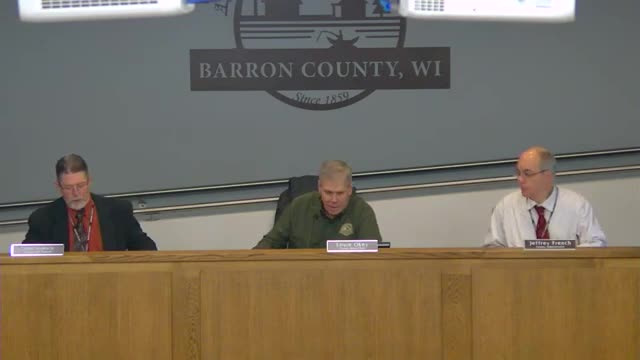Barron County counsel outlines limits of local authority on Chapter 980 supervised releases as neighbors demand lease details
Get AI-powered insights, summaries, and transcripts
Subscribe
Summary
At a Barron County Board of Supervisors meeting, the county corporation counsel briefed supervisors on Chapter 980 civil commitment and supervised-release placements, telling the board that state statute and court orders largely determine where and how those individuals may live and that counties have limited authority over placement decisions.
At a Barron County Board of Supervisors meeting, the county corporation counsel briefed supervisors on Chapter 980 civil commitment and supervised-release placements, telling the board that state statute and court orders largely determine where and how those individuals may live and that counties have limited authority over placement decisions.
The counsel told the board the statute “grants you no authority as a county board to address that issue,” and walked supervisors through the state’s process for civil commitment, release and court oversight. The presentation emphasized that supervised release is a civil treatment program, not an additional criminal sentence, and that people placed under Chapter 980 may petition the court annually for reduced restrictions or release.
Why it matters: the placements have drawn sustained local attention and at least two recent supervised-release placements were the subject of intense questions from nearby residents. Neighbors pressed the board for public records about leases, the costs being paid to vendors, and for more local control of placement locations; some said they felt insufficiently informed about the process.
County counsel described how the state Department of Health Services coordinates placements and typically contracts with private vendors that identify residences meeting strict statutory criteria. Counsel said those vendor agreements and rental rates are negotiated by the state agency and that the county itself plays a “very small piece” in the process. He said vendors must find homes that meet statutory distance and other criteria and that locating suitable units can be difficult.
The counsel explained the supervised-release conditions in detail: placements require a residence to be identified before release, some residents are on 24/7 electronic monitoring and may not leave the residence without a chaperone during an initial period, and there are roughly 75 specific rules residents must follow. He said violations can lead to re-commitment. He also said counties can be subject to court orders requiring them to locate placements and, if they fail to do so, could face fines or contempt orders.
Sheriff Fitzgerald answered operational questions about local notifications and monitoring. The sheriff said the county’s alert system sends messages to enrolled phone numbers rather than tracking a family’s physical location; a neighbor who signed up would receive alerts whether she was at home or elsewhere. The sheriff also confirmed that local law enforcement do not make clinical or placement decisions for Chapter 980 cases; they respond when notified.
Supervisors asked whether municipalities can pass local ordinances to bar placements; counsel said municipalities’ ordinances may restrict placement of registered sex offenders generally, but for Chapter 980 placements municipalities are preempted by state law from enacting rules that would block or limit placements under that statute.
Members of the public used the meeting’s public-comment period to press for records and express safety concerns. Walter Herman, who said he lives next to a recently used placement, called the process “very kept secret” and asked for copies of the lease and other records, stating, “I want to see it. This is public knowledge.” Dennis Rochelle and other speakers asked for meeting minutes and more transparent notification to neighbors.
No formal board action on placement policy was taken during the meeting. Counsel said the board could draft or consider a resolution advocating legislative change, but warned supervisors that any county-level change that attempted to prevent release or deny the procedural rights provided under Chapter 980 would face constitutional and legal limits.
The board received information and answered public questions; officials said they would continue to coordinate with the state Department of Health Services and the Department of Corrections on individual placements and follow any court directives.
Ending: Several supervisors expressed a desire for clearer, earlier notice to impacted neighbors and asked staff to provide available records; counsel reiterated that many operational details—rental agreements and vendor contracts—are negotiated by the state and that any change to how placements are handled would require legislative action or a change in state policy.
